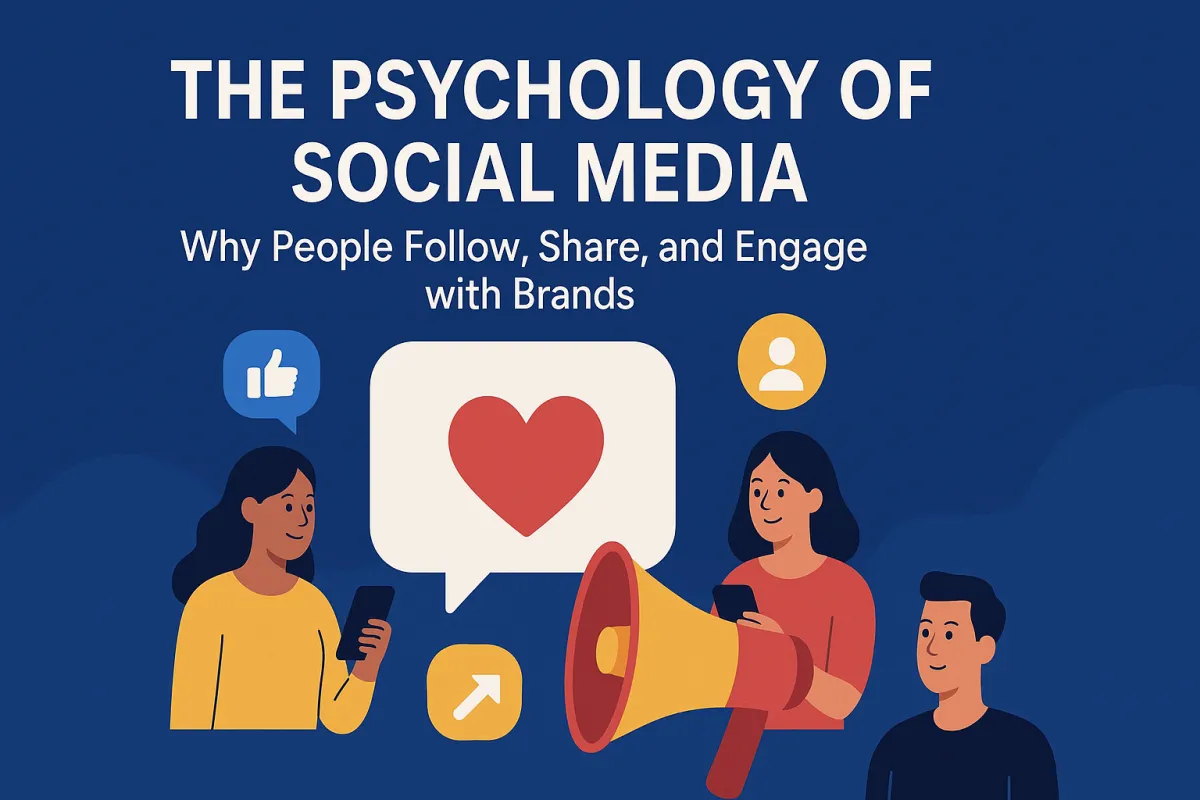
The Psychology of Social Media: Why People Follow, Share, and Engage with Brands
Social media has become an integral part of daily life. From checking Instagram stories to engaging with TikTok trends, billions of users are constantly interacting with content. But what motivates people to follow, share, and engage with brands online? The answer lies in psychology. Understanding the emotional and behavioral drivers behind social media engagement can help businesses build stronger relationships with their audiences and improve their marketing strategies.
In this article, we’ll explore the psychology behind social media behavior and why it matters for brands.
1. The Need for Connection and Belonging
At its core, social media fulfills a basic human need: connection. People follow brands that resonate with their values, lifestyle, or identity because it makes them feel part of a community.
Brands as tribes: Followers often see brand communities as tribes where they can share common interests, whether it’s fitness, fashion, or technology.
Emotional attachment: A strong emotional bond with a brand creates loyalty. For example, Apple users often follow Apple not just for product updates but because it reinforces their identity as part of an “exclusive community.”
When brands foster this sense of belonging, followers become more engaged and are more likely to advocate for the brand.
2. Social Proof and the Influence of Popularity
Humans are naturally influenced by what others are doing. This psychological phenomenon, known as social proof, explains why people are drawn to brands with high visibility and popularity.
Follower counts: A brand with millions of followers seems more credible and trustworthy than one with a small audience.
Engagement metrics: Likes, shares, and comments act as endorsements, convincing others that the brand is worth engaging with.
Influencer effect: When trusted influencers share or recommend a brand, their followers are more likely to adopt the same behavior.
This is why many users follow and engage with brands—they perceive them as socially validated and reputable.
3. The Desire for Value and Rewards
People don’t just follow brands out of curiosity; they follow because they expect value in return. This value can come in different forms:
Exclusive offers and discounts – Followers stay connected to brands for promotional deals.
Educational content – Brands that share tips, how-to guides, or industry insights gain trust and engagement.
Entertainment – Humorous, inspiring, or relatable content motivates people to share and engage.
The psychology here is clear: when users feel rewarded, whether through tangible benefits or valuable knowledge, they are more likely to engage consistently.
4. The Power of Identity and Self-Expression
Social media is often a stage for self-expression. People share content that reflects their personality, beliefs, and aspirations. When a brand aligns with these personal identities, it becomes part of how followers express themselves.
Aspirational branding: Luxury brands attract engagement because they represent a lifestyle people aspire to.
Cause-driven brands: Companies that stand for social or environmental issues attract followers who want to signal their values.
Relatability: People are more likely to share content that mirrors their personal struggles, humor, or passions.
In short, when engaging with a brand makes users look good or reinforces who they are, they’re more likely to share and follow.
5. The Role of Emotions in Engagement
Emotion is a key driver of social media activity. Content that sparks strong emotions—whether positive or negative—is more likely to be shared.
Happiness and inspiration: Motivational stories, uplifting campaigns, or feel-good ads spread quickly because they make people feel good.
Surprise and awe: Creative, unexpected content captures attention and is more likely to go viral.
Anger or fear: Sometimes controversial or thought-provoking posts trigger conversations, although they must be managed carefully.
Emotions not only fuel engagement but also create lasting memories associated with the brand.
6. FOMO (Fear of Missing Out)
FOMO is another psychological factor that drives people to follow and engage with brands. Social media thrives on immediacy—limited-time offers, trending hashtags, and real-time updates encourage quick action.
Flash sales and countdowns: Brands use urgency to keep followers hooked.
Trending content: People share viral posts because they want to be part of the conversation.
Behind-the-scenes access: Exclusive content makes followers feel special, fueling loyalty and engagement.
FOMO keeps users actively connected to brands, ensuring they don’t miss out on valuable experiences.
7. Reciprocity: Give and Take
Another psychological principle at play is reciprocity—when someone receives something valuable, they feel inclined to give back.
Engaging responses: When brands reply to comments or messages, customers feel acknowledged and more likely to stay loyal.
Free resources: Brands that offer free guides, eBooks, or webinars often see higher engagement because people feel motivated to return the favor by sharing or promoting the content.
By offering value first, brands can encourage deeper engagement and advocacy.
8. Building Trust Through Consistency
Finally, people follow and engage with brands they trust. Trust is built through consistent messaging, reliable customer service, and authentic interactions.
Transparency: Brands that openly communicate their processes and values build credibility.
Consistency in tone and visuals: Familiarity reinforces trust and strengthens brand identity.
Responsiveness: Prompt replies to customer queries demonstrate reliability.
When users trust a brand, they are not only more likely to follow but also to recommend it to others.
Conclusion
The psychology of social media engagement is rooted in human needs and behaviors—connection, validation, value, self-expression, emotion, and trust. People follow brands to feel part of a community, share their identities, and gain rewards. They engage because the content sparks emotions, fulfills their desires, or makes them feel valued.
For businesses, understanding these psychological drivers is key to building strong social media strategies. By creating authentic, value-driven, and emotionally resonant content, brands can go beyond vanity metrics and foster meaningful relationships with their audiences.